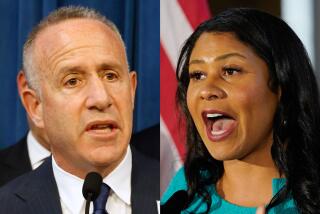Kollek Defends City Against ‘Silliness’ : Israel: The indefatigable mayor of Jerusalem is nearing 80, but shows no intention of retiring.
- Share via
JERUSALEM — Teddy Kollek’s pet word for the day was “silly”--mild by the standards of the blunt-talking Jerusalem mayor.
A Cabinet minister making his home in the Muslim Quarter: “silly.” A pledge by Prime Minister Yitzhak Shamir to build yet another Jewish housing project in Arab east Jerusalem: “silly.”
His own decision to run for mayor 25 years ago: “the silliest.”
Teddy Kollek will be 80 in May, and is showing no inclination toward imminent retirement.
Up at dawn, at work until near midnight, he gives new meaning to the word “indefatigable.” His bustling frame and thick hair haven’t changed in years. He is one of the world’s best-known mayors, with an office full of teddy bears sent by admirers.
The Oct. 8 blood bath on the Temple Mount has plunged Jerusalem into its worst crisis in 23 years, but it hasn’t dimmed Kollek’s enthusiasm for the city.
After the killing of at least 17 Palestinians by police confronting a stone-throwing mob, Kollek sounded angry and self-critical.
In an interview with the Maariv newspaper, he railed at the government for failing to treat the Arabs as equals, and at himself for not doing enough for them.
“For the Jews, I did something. But for the (Arab) east? Nothing. Enough blah-blah! What have I done? Schools? Nothing. Sidewalks? Nothing. Cultural centers? Nothing,” he stormed.
But later, in an interview at his City Hall office, he seemed calmer.
“I think it will take a long time until it gets back to where it was,” he said. “It was a very traumatic event.”
But he saw signs that the dust was settling.
Arabs who boycotted the municipality immediately after the shootings were trickling back looking for help with their problems, he said. He pointed to small gestures--Arabs who spotted a bomb and called the police; Arabs who rescued a Jewish family from a mob. He wants to give them medals for public service, but the Arabs, he says, fear the publicity.
The Palestinian vengeance attacks that followed the Temple Mount killings began with three Jews knifed to death in Jerusalem. Although the stabbings spread around the country, it was Jerusalem’s image that took the worst beating. Tourists, both foreign and Israeli, have stayed away in droves.
Shlomo Lahat, mayor of Tel Aviv, came here with 1,400 schoolchildren the other day as part of “Jerusalem--especially now,” a campaign to demonstrate solidarity with the city. “I am a Jerusalemite,” declared Lahat, borrowing from the late John F. Kennedy’s celebrated phrase “Ich bin ein Berliner.”
“I’m very moved, even though that usually doesn’t happen to me,” Kollek replied. “People are afraid of coming to Jerusalem these days. . . . It’s no secret.”
In an Israel increasingly drawn to mystic nationalism, Kollek remains a convinced pragmatist, a throwback to the “deeds, not words” philosophy of his mentor, David Ben-Gurion.
The realist in Kollek tells him that managing a city of Jews and Arabs in the cockpit of the Mideast conflict requires a hard head and a feel for compromise. Hence he has little patience for rhetoric.
“You have to work with tweezers,” he says. “You can’t do anything with grand declarations. . . . I can do lots of little things that together amount to something. I think this is the only way.”
He blames many of Jerusalem’s problems on “heavy-handed government” and an Israeli tendency “to approach every problem with an open mouth.” But he faults the foreign media for treating Jerusalem as though it was the only city in the world with communal strife.
“I was terribly encouraged by a silly affair--by the fight between Montreal and the Mohawks about a golf course,” he remarked. “It’s ridiculous, right?”
Kollek lists various concessions made by Israel after it captured Jerusalem from the attacking Jordanian army in 1967: a semi-free Arabic press, a choice of Israeli or Jordanian citizenship, Arab curricula in schools and Muslim control of access to their holy places.
The trouble, he says, is that these are now taken for granted.
More to Read
Sign up for Essential California
The most important California stories and recommendations in your inbox every morning.
You may occasionally receive promotional content from the Los Angeles Times.











